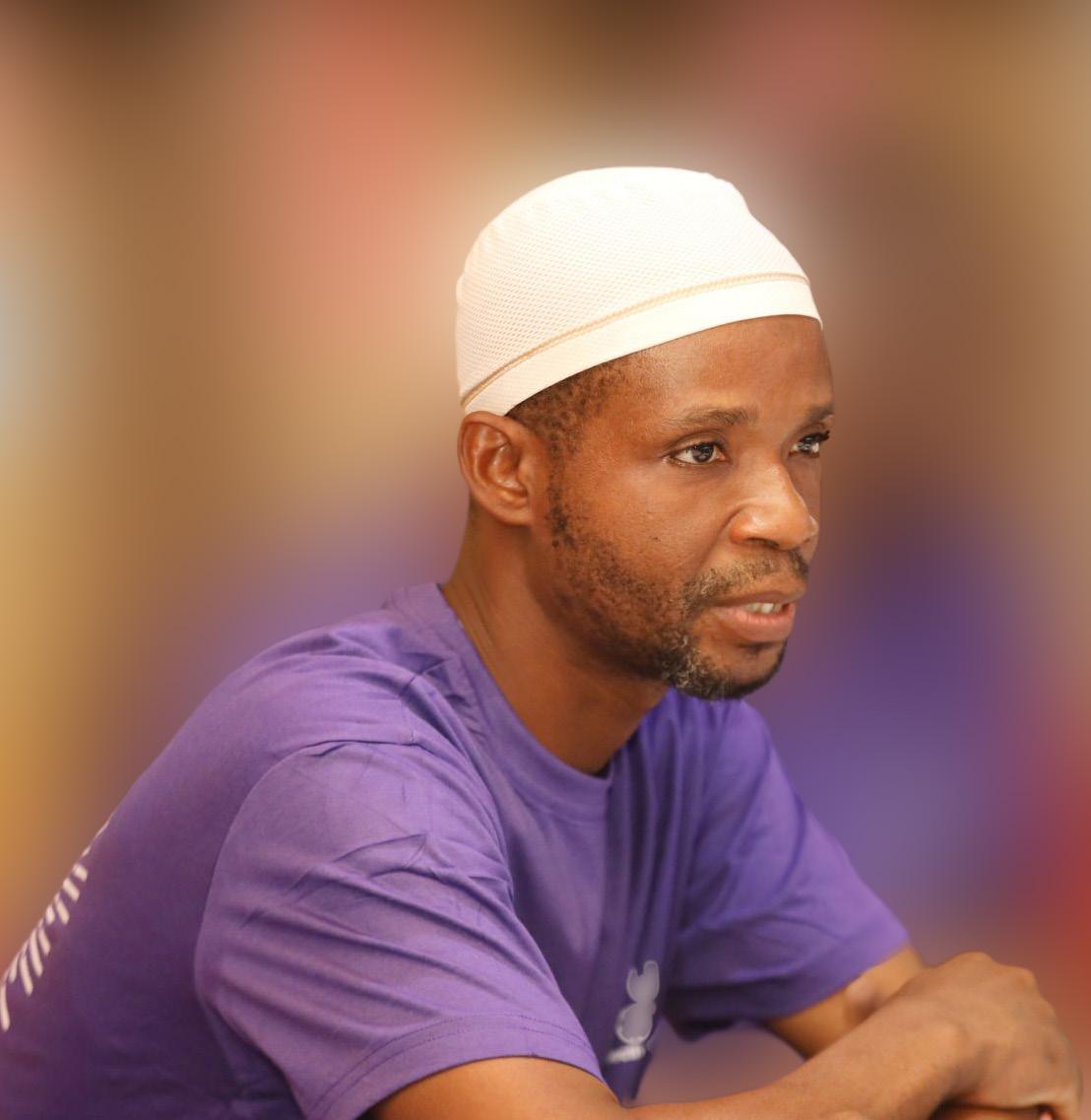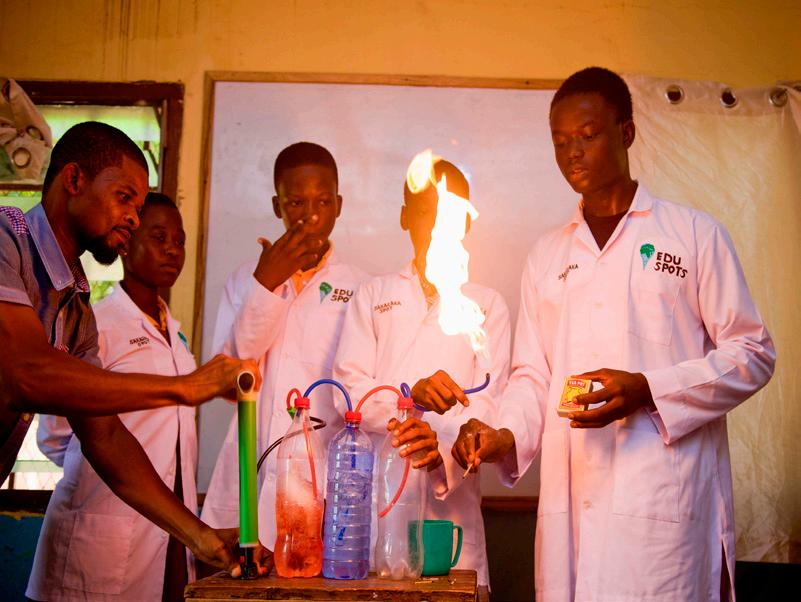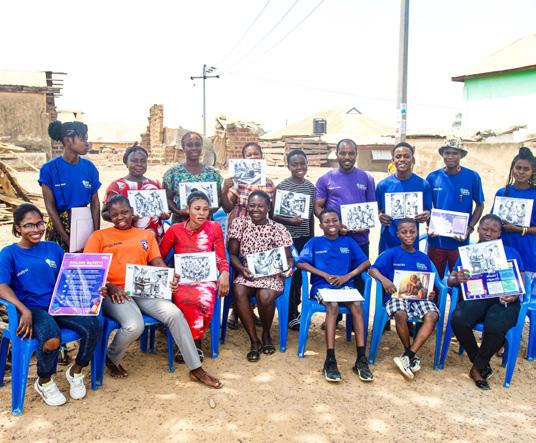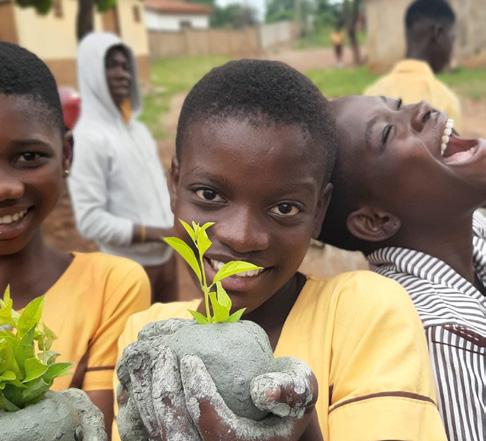





The EduSpots programme has successfully transformed educational landscapes across Ghana, fostering a new generation of active, empathetic citizens and catalysing community-driven change.
(Expectation State, Independent Evaluation, 2025) We will publish our comprehensive Annual Report later in 2025. Visit www.eduspots.org for more information.


My education stopped when the chalk ran out; with one torchlight shared by my family, I persisted, driven by my desire for a brighter future for the next generation.
(Dulugu Spot Founder and Regional Coordinator)

In rural areas of Ghana, 35% of children do not complete primary school.
(UNESCO, 2020)
In 2024 alone, 83 community teams requested to join EduSpots, committed to strengthening local engagement in education.
Since 2015, over 800 local Catalysts like Getrude have come together to drive educational change, creating the organisation that has become EduSpots.
EduSpots’ unique blend of fun, community-rooted, and future-ready education is led by voluntary Catalysts at inclusive, community-led learning spaces named ‘Spots’ through co-curricular clubs and wider informal learning sessions, using digital tools.
The Catalysts - a growing movement of teachers, youth and parents - grow their leadership, education and professional skills, all whilst inspiring over 10,000 learners annually to become the next generation of empathetic and informed changemakers.



Educational inequity is growing, and local leaders - teachers, youth and parents - have untapped talents, energy and ideas.



Learners, teachers and community members grow their confidence, optimism and engagement in education, creating the futures they want to see through a sustainable grassroots network.


Weconnect,trainand equiplocalCatalyststo lead fun,communityrootedandfuture-ready education through co-curricularclubsin spacesnamed‘Spots’ usingdigitaltools.

School and wider communitybased learning becomes more inclusive, interactive and relevant. Both locally, and nationally, communities work together to advance education.

EduSpots has built an effective network of young people and community members who initiate positive changes. This approach has created a new generation of leaders who can sustain and expand EduSpots’ work.
(Expectation State,


In 2024, there were:

10,439 LEARNERS
Enabled to become independent learners through resources, study space and mentorship.

2809 SPARKS
Aged 3-16, engaged in fun, community-rooted and future-ready education clubs.
23 STAFF
Growing as leaders, 40% from Catalyst backgrounds. All full-time staff are Ghana-based.

8
PEER MENTORS
Catalysts trained in mentoring, gaining professional skills working alongside staff.


402 CATALYSTS
Local changemakers trained in the model through the Ignite Programme, and growing as leaders and educators.
50
SPOT LEAD CATALYSTS
Catalysts building their leadership capacity through the Catalyse Leadership Programme.

Beyond this, Catalysts also engage and involve an estimated 25,000 community members in themes such as gender equity and safeguarding through events, radio shows and home visits.


My parents didn’t really go far with education. When my dad heard I was involved in EduSpots, he was like “WOW!”
Through EduSpots, I’ve improved my reading, creativity and use of technology. Now, I think critically to solve problems and make vital decisions.
(Abdul Manaf, 13 year old Spark and Catalyst, Abofour Spot)


2018
Joins DigiLit in Class 3 feeling anxious about maths and speaking English.
2019
VisitstheSpottoread books,usescience setsandengagewith Catalysts.
During the pandemic, he borrows books and engages in #StayAtHome challenges.
2023
Becomes the EcoSTEM Club President, leading the club’s activities.
2025
Manaf is EduSpots’ Learner of the Year, and plans his future as a staff member!
2022
AttendsEcoSTEM clubandreportshis classesbecoming morepractical,fun and engaging and his conidencegrowing.
2024
JoinsEduSpots asaCatalyst supporting youngerlearners withdigitaltools andorganizing booksandattends IgniteAcademies
EduSpots in 2024: Our Collective Impact
Literacy in the community has improved
Teaching is more fun and practical
Learners take leadership roles Learners stop skipping class
Learners are more confident and creative
Teachers and students are working together
Reduction of corporal punishment in school and community
Learning spaces are more inclusive
In the future, I hope to study science at university and then become an EduSpots staff, to help mentor younger ones to become great Catalysts like me.
65% of learners took on leadership roles at the end of the clubs programme.
(Expectation State, Independent Evaluation, 2025)


Scan here to watch the full journey of Manaf



Before joining the Catalyse Leadership Programme, I was an ordinary headteacher. I returned not just as a school leader, but as a strategic leader, a change maker, community builder and staff-developer.
Classroom observation data showed a 45% increase in student-centred learning approaches among teachers exposed to the EduSpots model.
(Expectation State, Independent Evaluation, 2025)
(Hamidu Kaadri, Headteacher & Catalyst, Yamfo Spot) 2020
Supports Spot’s founding by Aishetu, his student . Joins Ignite Programme, leading DigiLit and EcoSTEM clubs Joins Catalyse Leadership Programme leading Catalyse Project.
Selected as Spot Lead Peer Mentor, semi-staff role
After EduSpots’ training I started to get closer to all the stakeholders in education - parents, chief imams and all the rest. Having explained the concept of EduSpots to them, together with my teachers, many things changed in this school and in the community as a whole.

HAS OBSERVED IN YAMFO
Catalysts and teachers sharing ideas
Pupils teaching each other
Further support for students with special educational needs

Improved management of teachers
EduSpots in 2024: Our Collective Impact
Use of digital tools for research Shift in pedagogy, to be more playbased, practical and inclusive
Collaboration with other headteachers via Zoom
Schools and headteachers are all learning from the EduSpots model’s safeguarding activities and they sometimes call us to come and give them a talk on how to manage certain activities in their schools
(Hamidu Kaadri, Headteacher & Catalyst, Yamfo Spot)
Keeping Spots Safe in EduSpots
100% of Spots in EduSpots complete the Keeping Spot Safe Badge as part of EduSpots’ commitment to creating learning spaces that are safe, inclusive, and caring for everyone.
This includes:
1. Engagements with Sparks, including understanding their rights and responsibilities, and expressing feelings.
2. Engagements with Catalysts including forms of abuse and behaviour management strategies.
3. Community engagement sessions with parents, including online safety.
4. Explanation and posters on the process for ‘passing it on’, with quizzes and interviews to test understanding and action.
5. Regular ‘Together Thursday’ sessions explore safeguarding, inclusion and well-being in education.
There was a 52% increase in Catalysts’ self-reported empathy and cultural sensitivity scores.
(Expectation State, Independent Evaluation, 2025)

EduSpots in 2024: Our Collective Impact
The change that Hamidu Kaadri has observed in his school: Previously some special educational needs learners could not stay in the school because of how the other learners were treating them.
But after we took them through the safeguarding approaches, the behaviours of the learners and teachers themselves changed to be more inclusive; now the parents are brining them back to school.


Studying at African Science Academy, took EduSpots’ online course
50% of the global staff & peer mentor team have Catalyst backgrounds, with 100% of full-time staff based in Ghana.
The story of Getrude Akunlibe
Dulugu Spot Founder and Regional Coordinator
Getrude grew up in a rural area of Bolgatanga where more than 70% of households lacked power and 90% of individuals lacked formal education. She was one of the fortunate 0.5% that made it beyond secondary school, and this experience fuelled her ambition to shift the narrative.
Works with Spot team to lead DigiLit and EcoSTEM clubs Applied to set up Dulugu Spot
Dulugu Spot commissioned following mentorship
Active Catalyst, driving change in her Spot & beyond
Getrude graduates top in her class in Computer Science as a Presidential Scholar Joins EduSpots as part-time EcoSTEM Coordinator
At first, my community believed only a powerful authority could bring educational reform. Today, the presence of Dulugu Spot and the impact made by local Catalysts has changed that perception.
Becomes full-time regional coordinator for Northern Cluster, also supporting the app development process


I recruited Catalysts and worked relentlessly to shift my community leaders’ traditional mindsets of leadership being male-dominated.
As a result, rigid preconceptions about women’s roles in my community have now shifted.
At the start of the Dulugu EcoSTEM Holiday Camp, only 1 out of 20 girls could turn on a computer.


Perceptions of the role of women have changed
My confidence and adventurous attitude, fueled by my engagement in EduSpots, helped me secure a full scholarship to pursue a degree in computer technology, which I accomplished with distinction. EduSpots has served as a beacon of light for me, and I hope to continue extending that light to many others, whilst developing my own leadership skills’
The invention model, focusing on community ownership, innovative teaching methods, and cultural alignment, has proven effective in measuring the model’s impact and its potential to be replicated in other contexts.

These were some of the key findings
68% of parents reported being more engaged in their children’s learning.
(Expectation State, Independent Evaluation, 2025)
In December 2024, we commissioned Expectation State to lead an independent evaluation of our work across 10 sampled Spot communities - they were a mix of school and community-based Spots, in diverse regions, in existence from a range from 1-9 years.
Expectation State interviewed 211 students, teachers, Catalysts, community leaders, staff and headteachers in this process.
They used an outcome harvesting approach, triangulating evidence from desk research, surveys and qualitative research methods such as focus groups and semi-structured interviews.
Pedagogical transformation: 1


The shift towards more learner-centred, inclusive, and practical teaching methods has transformed school-based pedagogy, making education more relevant and engaging for students.
for money, systems and sustainability:

The model offers a structured approach to programme delivery. It offers significant value for money, leveraging volunteer engagement and capacity building to maximise impact.
Replicability in new contexts: 3

The study confirms that “the model’s ability to be replicated and the general benefits derived by the community indicate its potential to make a lasting impact in diverse contexts, positioning EduSpots as a promoter of educational equity and community.”
Co-creative learning environments: 4

One headteacher commented: “Now, I see myself as a facilitator, guiding students to discover knowledge for themselves. The energy in my classroom has completely transformed.”
Civic action and leadership: 5

One Catalyst commented: “most students are now confident when speaking in public, using their voices when necessary and participating in advocacy campaigns to fight for their rights and the rights of vulnerable groups.”
Environmental action: 6

The Community is cleaner and safer without plastic sachets and litter, as students now use the waste to produce important items like raincoats, footwear, and others. Open defecation has also declined since EduSpots came around.
Trends analysis showed a 40% increase in learners’ participation in civic activities throughout the programme.
(Expectation State, Independent Evaluation, 2025)


The team has integrated all of these recommendations, and others, into the ongoing strategic development plan for 2025 and beyond.


Deepen local community engagement working with local teams. Advance local community partnerships and fundraising, creating a database for local Spots to access.

Develop a guidebook for the Spot model, with school-based and communitybased versions



Implement a system for regularly assessing and adapting Spot models based on local feedback and performance metrics.
Scan here to read the full report from Expectation State.


Continued analysis of the relationship with government curriculumbased content

We have seen some tremendous changes after introducing EduSpots. With regards to EduLit, these kids can now read fluently, unlike previously. Also, looking at Edukids and EcoSTEM have changed students’ attitudes towards learning Science and Maths

EMOTIONAL ENGAGEMENT in Maths and Science for learners
13% increase
In 2024, we completed a range of quantitative studies with Impact Ed to evaluate the change across our programmes, using validated surveys to test changes in attitudes and skills across a 10 month period.
SENSE OF COMMUNITY INDEX
4.8% increase
Ignite Programme participants, over 12 months, 55 surveyed

3.5% increase
Catalyst Leadership Programme over a 12 month period in Catalysts, 27 surveyed
EcoSTEM club members, across 10 months, 107 surveyed
METACOGNITION across learners
2.4% increase
EduLit club members, across 10 months, 101 surveyed

The model recognises that each community is unique, with different needs and priorities, and emphasises the importance of community-driven change.
(Catalyst, Expectation State, Independent Evaluation 2025)
In 2024, 50 Spot teams involved 158 schools in fun, community-rooted and future-ready learning. All Spots are owned by the community with all ongoing costs paid at the local level. 12 Spots run on solar power.
We welcomed 12 new Spots to the network through a structured recruitment process, which is due to be reopened in July 2025.
25% of current Spots were set up by existing Catalysts who had moved communities.



A Spark’s perspective:
It has boosted the confidence level of everybody and we have been able to work as a team which has been amazing. I will work hard in order to become a volunteer, so that I will help my community members and educate them on how to use the library.
(Yaw George Atsu, EcoSTEM club member)

A Catalyst and teacher’s viewpoint:
Aged 19, Nimatu Abdul-Rahman founded Savelugu Spot in 2019 in a small office space in the school she attended, aiming to improve literacy outcomes for students coming after her.
In 2024, in partnership with the PTA who part funded the building, Savelugu Spot runs in a spacious solar-powered facility overseen by a Spot Management Committee.


6 days a week
12 Active Catalysts Includingincluding students, teachers and nurses.
Yaw Pele
(Catalyse Leadership Programme participant)

It’s a dream come true. Before, when we came for our Ignite Equity session, we had to wait for EduLit to finish, but now we have a spacious library where we can all work together, it’s so exciting and awesome.
I’ve learnt a lot about teamwork in EduSpots – when you want to do a task, you don’t have to do it alone.
(Okomongye Diana, teacher and Catalyst)

schools using the Spot
learners using the Spot 7 evenings a week

Adam Ibrahim (Peer Mentor)
Nimatu Abdul-Rahman (Catalyst Committee Vice-Chair)

78% of Spots have secured local funding or partnerships to support ongoing operations.
(Expectation State,Independent Evaluation, 2025)
EduSpots’ model has a focus on training and supporting local Catalysts to acquire their own funds and resources through community mobilisation; we also fostered partnerships to support with some resource distribution.

New books by local authors
(Catalyst, Independent Evaluation, Expectation State) 1,360 3,729 3,531 1,560 2000+

The reading and writing skills of club members (which include learners from other schools) have improved, as have their creativity and ability to think critically in solving problems.
97% of learners surveyed reported an improvement in reading and writing skills, with 60% noting a significant improvement through EduSpots.
(Expectation State,Independent Evaluation, 2025)

EduSpots embeds digital skills training for Catalysts and learners across its programme design. We distributed the following devices in 2024:




This is my first time to have an opportunity to use a tablet. The experience cannot easily be forgotten due to the “talking” Alexa in the tablet.

ONE CATALYST IN AHENKRO SPOT COMMENTS THAT:
The tablets have created a modern, inclusive and engaging learning environment that is supporting learners’ academic and personal growth and increasing interest in education.

In 2024, EduSpots developed an app to enable Catalysts and staff to register Catalysts and learners effectively, access EduSpots’ programmes and mentoring, and have live information of Spot activities. In 2024, over 300 Catalysts and 2000 learners are registered.

Now, we focus on learning through hands-on experience and ensure everyone participates. We also use visuals in teaching with a projector.
(Catalyst, Expectation State, Independent Evaluation, 2025)
The strand resource kits serve as invaluable tools to facilitate a learning process that is interactive, student-centred and inclusive with packs of monthly challenges guiding Catalysts and learners in practical projectbased learning alongside practical and sustainable tools such as Dext Technology STEM kits, phonics sliders and wider teaching aids.





The Spot has become a hub for more than just education. We now use it to organise community clean-up drives and awareness campaigns.
(Community elder, Expectation State, 2025 )
Catalysts were given 166,410 Ghana Cedis (£8,913.83) in grant funding to design projects across 4 areas:

The Catalyse Leadership Programme:
Catalyse Project Grants for all participants.
Example: Mohammed Fuseini using STEM kits in Dulugu transforms science education across the district.

Sustainable enterprises to support menstrual hygiene challenges.
Example: Learners and Catalysts in Ameyaw create soap to sell to create income for sanitary pads.

Green Spot Innovation Challenge:

To support community engagements in Keeping Spots Safe.
Example: Catalysts and learners Abofour engage local parents using the Keeping Spots Safe picture cards.
Spots were given 10,000 cedis to design an intervention that solved a local environmental problem.
Example: Ideas ranged from school-wide plastics recycling and upcycling initiative in Abofour, to student-led tree planting and nurturing in Aboabo No 4 Spot.

This table reflects our collected data across 2022-2024, with ongoing advancements made here in 2025 via the introduction of the EduSpots’ app. Note that some changes are due to advances in data collection across the Spots. From 2022-2024, EduSpots had a consistent number of 50 Spots in the network with the figures below therefore reflecting local growth.














We were selected for the Dovetail Impact Foundation’s Acceleration Portfolio.
Professor Gloria Agyemang, Executive Dean at Royal Holloway’s School of Business and Management, University of London, was appointed Chair of Trustees of EduSpots Global.
Professor Elsie Effah Kaufmann, Dean of the School of Engineering Sciences at the University of Ghana, and televised NMSQ Quiz Mistress, became EduSpots’ Patron in Ghana.
Cat Davison, CEO, was selected as a Gratitude Network fellow and gave a TedTalk: How to Build a Movement for Community-Led Education at Academic City University, Accra
With thanks to all those supporting the journey to #OurCollectiveFuture, including the following...






















We’re not just implementing a pre-set model. Our ideas and experiences are actively shaping how EduSpots evolves. It’s truly a collaborative effort. (Catalyst, Ameyaw Spot, Independent Study, 2025)
As EduSpots celebrates its 10th anniversary, we are planning to expand the network from 50 to 100 Spots as we explore the potential to scale our impact in the years ahead. Email info@eduspots.org if you would like to join us in building #OurCollectiveFuture!



www.eduspots.org
